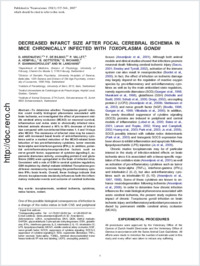Decreased infarct size after focal cerebral ischemia in mice chronically infected with Toxoplasma gondii
- Arsenijevic, Denis Department of Medicine, Division of Physiology, University of Fribourg, Switzerland
- Bilbao, Fabienne de Division of Geriatric Psychiatry, University Hospitals of Geneva, Belle-Idée - Division of Old Age Psychiatry, University of Lausanne, Switzerland
- Vallet, Philippe Division of Geriatric Psychiatry, University Hospitals of Geneva, Belle-Idée
- Hemphill, Andrew Institute of Parasitology, University of Bern, Switzerland
- Gottstein, B. Institute of Parasitology, University of Bern, Switzerland
- Richard, Denis Institut Universitaire de Cardiologie et de Pneumologie, Hopital Laval, Quebec, Canada
- Giannakopoulos, Panteleimon Division of Geriatric Psychiatry, University Hospitals of Geneva, Belle-Idée
- Langhans, Wolfgang Institute of Animal Sciences, ETH Zurich, Switzerland
-
11.10.2007
Published in:
- Neuroscience. - 2007, vol. 150, no. 3, p. 537-546
English
To determine whether Toxoplasma gondii infection could modify biological phenomena associated with brain ischemia, we investigated the effect of permanent middle cerebral artery occlusion (MCAO) on neuronal survival, inflammation and redox state in chronically infected mice. Infected animals showed a 40% to 50% decrease of infarct size compared with non-infected littermates 1, 4 and 14 days after MCAO. The resistance of infected mice may be associated with increased basal levels of anti-inflammatory cytokines and/or a marked reduction of the MCAO-related brain induction of two pro-inflammatory cytokines, tumor necrosis factor-alpha and interferon-gamma (IFNγ). In addition, potential anti-inflammatory/neuroprotective factors such as nerve growth factor, suppressor of cytokine signaling-3, superoxide dismutase activity, uncoupling protein-2 and glutathione (GSH) were upregulated in the brain of infected mice. Consistent with a role of GSH in central cytokine regulation, GSH depletion by diethyl maleate inhibited Toxoplasma gondii lesion resistance by increasing the proinflammatory cytokine IFNγ brain levels. Overall, these findings indicate that chronic toxoplasmosis decisively influences both the inflammatory molecular events and outcome of cerebral ischemia.
- Faculty
- Faculté des sciences et de médecine
- Department
- Département de Médecine
- Language
-
- English
- Classification
- Medicine
- License
-
License undefined
- Identifiers
-
- RERO DOC 10547
- DOI 10.1016/j.neuroscience.2007.09.080
- Persistent URL
- https://folia.unifr.ch/unifr/documents/300784
Statistics
Document views: 128
File downloads:
- pdf: 176
